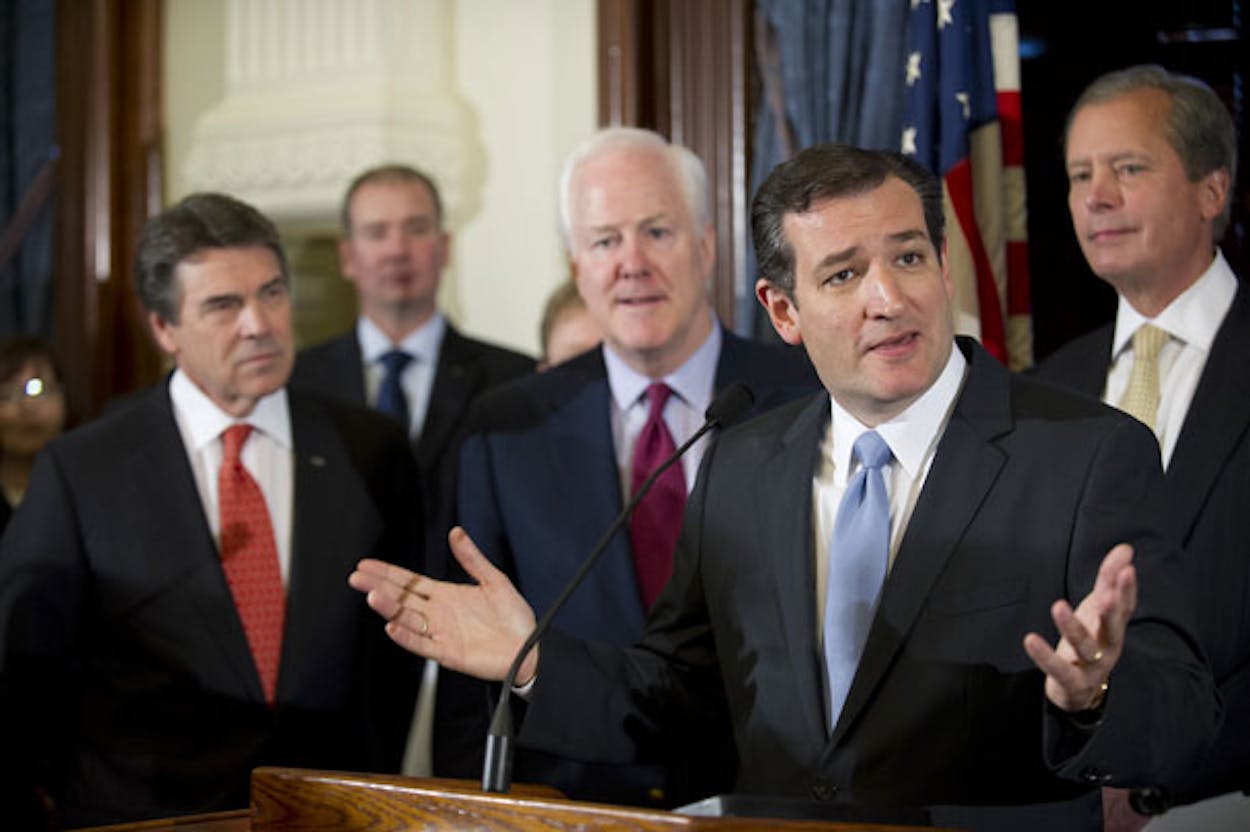The Capitol was the site of two dueling press conferences today over what could be one of the signature fights of the 2013 session: Medicaid expansion. Both parties trotted out some of their biggest stars to make their case. The Republican side featured Governor Rick Perry, Lieutenant Governor David Dewhurst, and U.S. senators John Cornyn and Ted Cruz. The Democrats countered with San Antonio mayor Julian Castro and U.S. representatives Joaquin Castro and Lloyd Doggett. And neither side hesitated to mince words.
In fact, the Republicans demonstrated several different ways to say no.
Perry: “Texas will not be held hostage by the Obama Administration’s attempt to force us into the fool’s errand of adding more than a million Texans into a broken system. Texas will not be participating in Medicaid expansion.”
Dewhurst: Medicaid “is threatening to bankrupt, not only the state of Texas, but every other state in the country.”
Cornyn: Medicaid expansion would “crowd out” other state funding priorities, including education and law enforcement.
And Cruz (who, fittingly, had been standing to Cornyn’s right): The other states “that are buying into this, that are expanding their Medicaid populations … will come to rue the day, because Medicaid will take a larger and larger portion of their state budgets.”
At issue is the provision under President Obama’s Affordable Care Act that would authorize the federal government to give $100 billion to Texas over ten years to pay for expansion. For three years, the federal government would cover all of the costs of expansion, with the state expected to match 10 cents for every dollar in three years’ time. But Perry slammed the idea that he’s turning away “free” money. “Texans … know there is no such thing as free money. There is only money that’s collected from taxpayers and money borrowed from other countries like China,” he said.
Perry and his supporters, including members of the Texas Public Policy Foundation, would like the feds to give the state Medicaid money in a block grant that the state could administer as it wishes. The governor’s office offered a four-point plan that includes health savings accounts, cost sharing initiatives (such a co-pays and sliding scale payments) and “asset testing.” Former majority leader Dick Armey and the TPPF’s Arlene Wohlgemuth opined in Politico that “having skin in the game” would mean that “Medicaid enrollees would be more efficient in their use of health care and more engaged as consumers.” (House Speaker Joe Straus, R-San Antonio, who was not present at the press conference, is one of few Republicans who have pushed for some form of Medicaid expansion. As he told Hearst’s Peggy Fikac in early March, “It’s time that we put forth a good-faith effort to find a Texas solution.”)
As the Republicans spoke in the Governor’s Public Reception Room, around thirty protesters in teal Texas Organizing Project shirts marched in a circle outside the room’s frosted glass doors chanting “Perry take the money!” and “Health care now!” Some hoisted hand-lettered signs and one woman, memorably, held up a placard bearing a (rather unflattering) photo of Cruz.
But while the protesters weren’t allowed in the room for the Republican press conference, they found a warmer welcome—and chairs typically reserved for press—an hour and a half later at the Democrats’ counter presser.
“Governor, I hope that you will give up the swagger and get serious about expanding Medicaid in Texas,” Joaquin Castro said, suggesting that Perry follow the lead of the governors of Arkansas and Florida to hammer out a state-specific solution that does not involve block grants. “If we don’t reclaim the federal dollars that Texas taxpayers are paying they will go to other states.” The expansion would cover an additional 1.5 million low income Texans, according to estimates.
A clutch of Texas House Democrats were also present, including Trey Martinez Fisher of San Antonio, head of the Mexican-American Legislative Caucus, who had perhaps the best rhetorical flourish of the day: “What we heard this morning is more of the same, which is ‘no’ and ‘mañana,’ he said. “Governor, ‘no’ is not a policy response and ‘mañana’ is the busiest day of the week in the Texas Capitol—we never get to it.”
Doggett said that while the Republicans’ Monday press conference was not encouraging, he still hopes they could engage in a dialogue to find a solution that would be “more flexible and more Texas in its orientation.”
“Other states … with Republican governors and Republican legislators [are doing it]—why should Texas give up not only on the disadvantaged but on taxpayers and hospitals and local governments when other states are claiming their share of these federal dollars?” Doggett asked.
After all of Monday’s bluster, very little—if anything—has changed. But that doesn’t mean the Lege won’t spend its last 55 days going round and round on the issue.
 Bob Daemmrich
Bob Daemmrich
- More About:
- Politics & Policy







